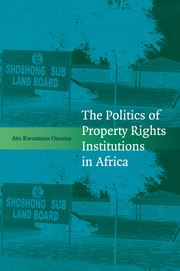Book contents
- Frontmatter
- Contents
- List of Maps and Tables
- Acknowledgments
- List of Abbreviations and Acronyms
- 1 Map of Botswana
- 2 Map of Ghana
- 3 Map of Kenya
- 1 Divergent Attitudes Towards Property Rights Institutions
- 2 Explaining Institutional Choice and Change
- 3 Varying Responses by Ghanaian and Batswana State Leaders
- 4 Traditional Leaders Take Charge in Akyem Abuakwa and Ga
- 5 Building and Then Demolishing Institutions in Kenya
- 6 Endogenous Contributions to Institutional Change
- 7 Conclusion
- Appendix: Notes on Field Research
- Index
- References
5 - Building and Then Demolishing Institutions in Kenya
Published online by Cambridge University Press: 04 May 2010
- Frontmatter
- Contents
- List of Maps and Tables
- Acknowledgments
- List of Abbreviations and Acronyms
- 1 Map of Botswana
- 2 Map of Ghana
- 3 Map of Kenya
- 1 Divergent Attitudes Towards Property Rights Institutions
- 2 Explaining Institutional Choice and Change
- 3 Varying Responses by Ghanaian and Batswana State Leaders
- 4 Traditional Leaders Take Charge in Akyem Abuakwa and Ga
- 5 Building and Then Demolishing Institutions in Kenya
- 6 Endogenous Contributions to Institutional Change
- 7 Conclusion
- Appendix: Notes on Field Research
- Index
- References
Summary
INTRODUCTION
In August 1961, Kenya was on the verge of independence, and colonial authorities with a multitude of issues on their hands were being harassed by the stubborn complaints of a certain European settler. Then safely ensconced in the European settler redoubt of Salisbury (now Harare), Southern Rhodesia (now Zimbabwe), Mr. E. F. P. Hill was pestering the office of the governor of Kenya with compensation demands for his farm, cattle, and farm tools.
Hill was seeking compensation because of what he saw as the abrogation of his titles to Stratton Estate in Kenya, contrary to earlier state assurances that they would not be abrogated “except for good reason and subject to the payment of full compensation.” Interestingly, unlike many estates, Hill's farms had not been targeted for acquisition by the state or threatened by squatters. Hill had faced no apparent threat to his person or property. The deracialization of the former White Highlands was what he saw as an abrogation. As he pointed out to the governor, “farms [in the vicinity] whose Title Deeds state they are to be sold to those of pure European descent only, have now been sold to Africans – surely that constitutes abrogation.”
Thus, to wisely escape Kenya's “second retrograde step” of independence, after the first “retrograde step” of “internal self-government,” Hill ran off to Southern Rhodesia and requested compensation in full.
- Type
- Chapter
- Information
- The Politics of Property Rights Institutions in Africa , pp. 144 - 175Publisher: Cambridge University PressPrint publication year: 2009



